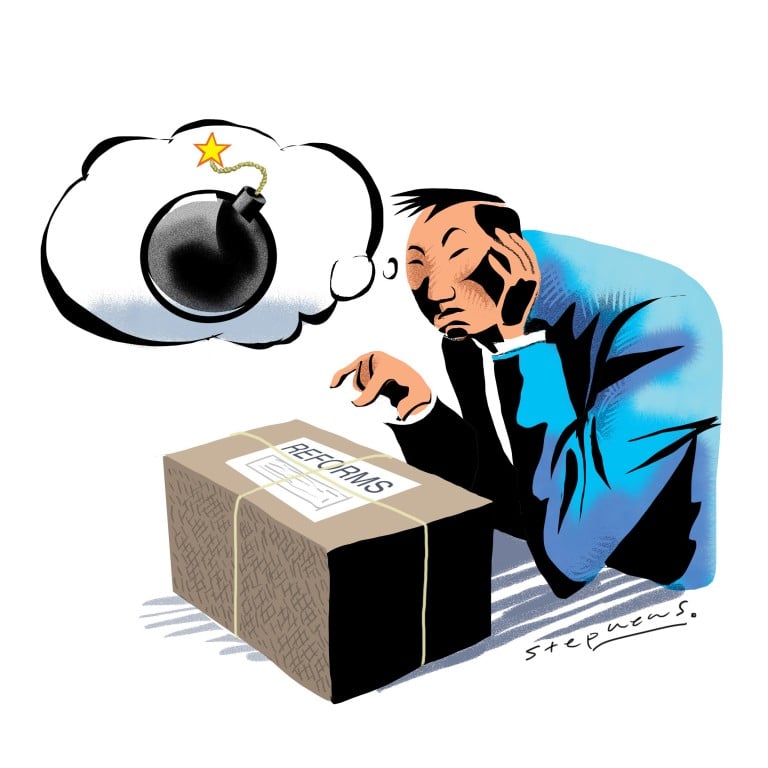
Until there's mutual trust, Hong Kong won't see universal suffrage
Ronny Tong says a change of mindset by Beijing and, above all, the pan-democrats will be crucial to survive the fallout from the reform fiasco and achieve democracy
So the Hong Kong government has finally released its blueprint for "universal suffrage" for the selection of our chief executive. No one was holding their breath and, to be sure, there were no surprises. What does surprise rational people, however, is that both the Hong Kong government and the pan-democrats think this battle, if not the war, will be won according to the results of opinion polls over the next six to eight weeks. Instead of trying to find a way out of this morass, they are both doing their utmost to swing popular opinion, blaming the other side for this likely political failure. How pathetic.
The result is written on the wall for all to see. This political reform package will not pass; and frankly, if you ask me, that's just as well. Why? Well, let's look at the possible scenarios, and there can only be three. First, the package will pass with a bare four votes from the pan-democrats; second, the package will pass, with some 10 to 14 pan-democrat votes; last, the package will be vetoed.
Let's look at each scenario in turn.
If there are four turncoats, the pan-dems would feel a heavy slap in the face. They would be even more frustrated and irate than when the National People's Congress Standing Committee decision came out last August 31 and would muster all their political might to call for another occupation and all kinds of non-cooperation inside and outside the Legislative Council. They would do their utmost to vilify everyone standing in their way. Students would feel more justified to protest indefinitely and some may even turn to the thus far insignificant "Hong Kong independence" movement. Beijing would feel duty-bound to clamp down and, inevitably, "one country, two systems" would fail or be perceived by all to have failed. In short, it would be Armageddon in the near and mid term. I shudder to think further.
If the package were to get the support of a sizeable number of pan-dems, the same result as above may still ensue but possibly on a lesser scale and Hong Kong may just survive. But, given the intransigent attitude of both sides, with the pan-dems repeatedly refusing to name the price for accepting the package and Beijing bent on stamping its seal of absolute authority, this just won't happen. So we may as well forget about this scenario.
The last scenario is probably the "best", given the dire situation Hong Kong finds itself in. With a "successful" veto, the pan-dems would claim a small victory. Although everyone else would regard it as a pyrrhic victory, judging by the way people reacted after the near failure of the five-district referendum in 2010, the pan-dems would not see it as such. They would thus have little incentive or persuasive power to call for any large-scale protest and, even if they did, it would not last long.
The democratic cause would suffer a short-term setback but one would hope that both Beijing and the pan-dems would begin to see their way; that we can't have democracy in Hong Kong unless they trust each other and work together. Indeed, "one country, two systems" will not survive much longer if they don't.
What can we learn from this fiasco? That we must change. We must change the mindset of the so-called pan-democrats. We must change the mindset of Beijing. They must see that this tug of war is doing no one any good.
Would it be the end of any political reform if the package is vetoed? I don't think so, despite all the rhetoric from Beijing. An ungovernable Hong Kong would be a constant pain when China needs to tackle much bigger issues worldwide. An ungovernable Hong Kong would also mean no long-term stability and prosperity, the one real aim of Beijing after the handover. But if Beijing may well have a rethink after the veto, would the pan-dems do the same? Looking at the way they keep painting themselves into a corner, I don't hold high hopes for a change of mindset - unless the current crop of leaders were to step down.
With the 2016 Legco election looming, perhaps the electorate will want a change of representatives. One thing is sure; Hong Kong people are very pragmatic. They do not want a legislature monopolised by pro-government parties. No matter how seemingly unpalatable, many will regard the pan-dems as still having a crucial role to play in Legco. What the make-up of the pan-dems will be is another issue. I can see, to some extent, more militants being elected; but, likewise, I hope to see more moderates winning a seat. In other words, there may be more diversity in the pan-dems' make-up; with proportional representation, anything is possible. So there is still a glimmer of hope.
It's anyone's guess whether the pan-dems will mellow and start to do some real work in developing a better relationship with Beijing in order to achieve genuine universal suffrage in the future. If none of the pan-democrats is seeing any sense now, we must fervently hope that they will begin to see sense after the veto. If they still don't, then that would be the beginning of the end. God help Hong Kong.

